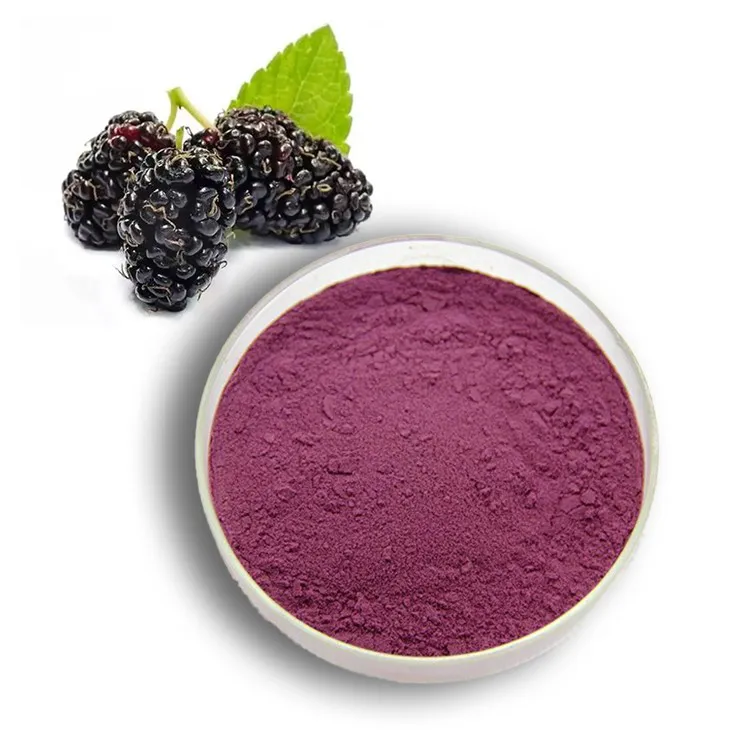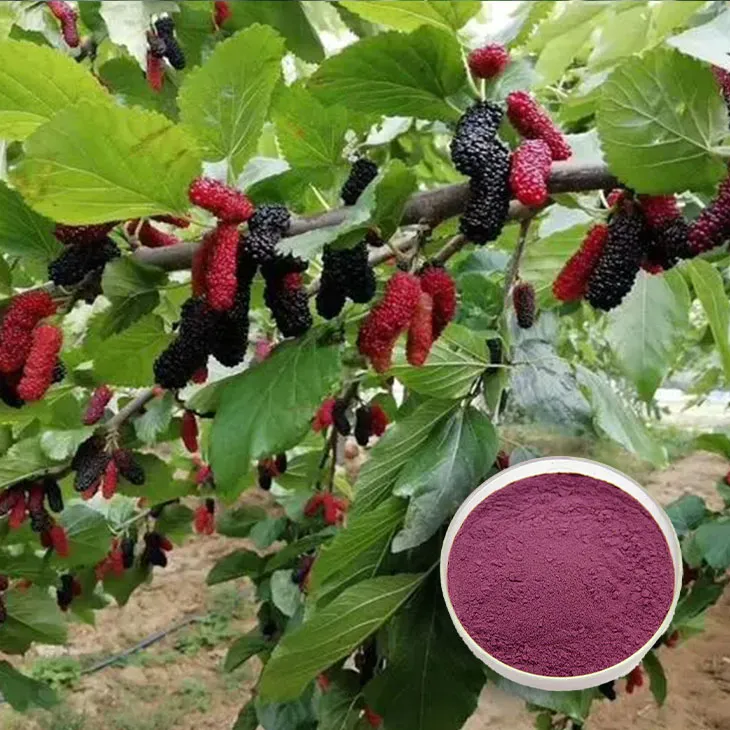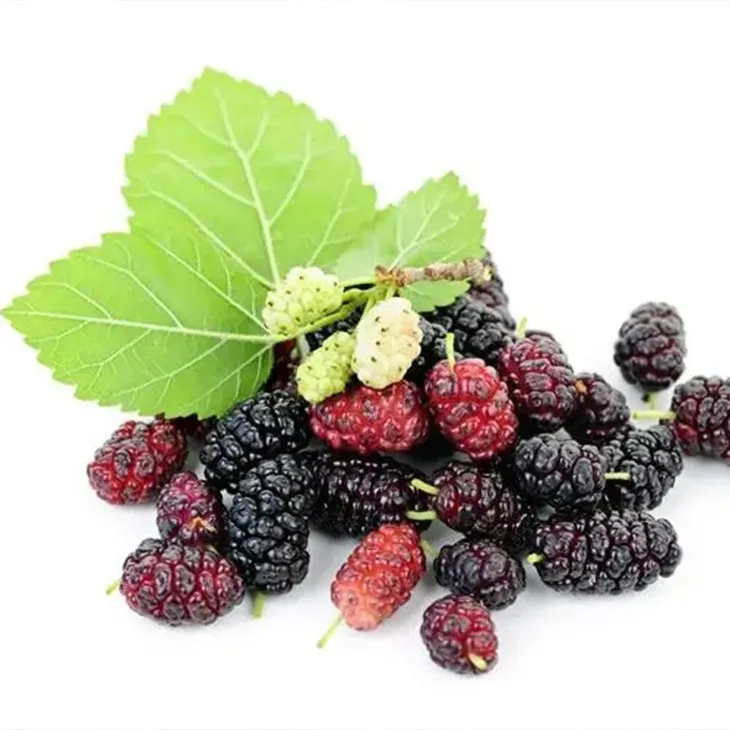- 0086-571-85302990
- sales@greenskybio.com
Benefits of Mulberry Extract in Cattle Feed.
2024-11-14

1. Introduction
The use of natural additives in animal feed has been an area of increasing interest in recent years. Mulberry Extract, also known as Sang - shen extract, is one such additive that has shown great potential in cattle feed. Cattle farming is a significant part of the agricultural industry, and any improvement in cattle health, productivity, and product quality can have far - reaching economic and nutritional implications.

2. Nutritional Composition of Mulberry Extract
2.1 Vitamins
Mulberry Extract is a rich source of various vitamins. For example, it contains vitamin C, which is an essential antioxidant. Vitamin C helps in protecting the cells of cattle from oxidative stress. It also plays a role in collagen synthesis, which is important for the integrity of various tissues in the body. Another important vitamin present in mulberry extract is vitamin E. Vitamin E is also an antioxidant that helps in maintaining the health of cell membranes. In cattle, a sufficient supply of vitamin E can improve the immune function and reproductive performance.2.2 Antioxidants
Besides vitamins C and E, mulberry extract contains other antioxidants such as flavonoids. These flavonoids have the ability to scavenge free radicals in the body of cattle. Free radicals are highly reactive molecules that can cause damage to cells, proteins, and DNA. By neutralizing these free radicals, the antioxidants in mulberry extract can prevent various diseases and also slow down the aging process in cattle cells.
3. Enhancement of the Immune System
The immune system of cattle is crucial for their survival and productivity. Mulberry extract can enhance the immune system through several mechanisms.
- Stimulation of immune cells: The nutrients and bioactive compounds in mulberry extract can stimulate the production and activity of immune cells such as lymphocytes and macrophages. Lymphocytes are responsible for recognizing and attacking foreign invaders like bacteria and viruses, while macrophages are involved in engulfing and destroying these pathogens.
- Enhancement of antibody production: Antibodies are proteins produced by the immune system to neutralize specific antigens. Mulberry extract can promote the production of antibodies in cattle, thereby increasing their ability to fight against diseases. This is particularly important in preventing infectious diseases that are common in cattle farming, such as bovine respiratory disease and foot - and - mouth disease.

4. Improvement of Digestion
4.1 Regulation of gut microbiota
The gut microbiota of cattle plays a vital role in digestion and overall health. Mulberry extract contains certain compounds that can regulate the composition and function of the gut microbiota. For example, it can promote the growth of beneficial bacteria such as Lactobacillus and Bifidobacterium. These bacteria are involved in the fermentation of feed, which helps in the breakdown of complex carbohydrates and the production of short - chain fatty acids. Short - chain fatty acids are an important source of energy for cattle and also have beneficial effects on the gut health, such as reducing inflammation.4.2 Digestive enzyme activity
Mulberry extract may also influence the activity of digestive enzymes in cattle. Digestive enzymes are responsible for breaking down food into smaller molecules that can be absorbed by the body. Some studies have suggested that the bioactive compounds in mulberry extract can enhance the activity of enzymes such as amylase, protease, and lipase. This can lead to more efficient digestion of feed, resulting in better nutrient absorption and growth performance of cattle.5. Influence on Beef and Milk Quality
5.1 Beef quality
- Flavor enhancement: The compounds in mulberry extract can potentially enhance the flavor of beef. This may be due to the presence of certain volatile compounds or the improvement of the fat composition in the meat. Consumers are increasingly demanding high - quality beef with good flavor, and the addition of mulberry extract to cattle feed could be a way to meet this demand.
- Nutritional value improvement: Mulberry extract can also improve the nutritional value of beef. For example, it may increase the content of certain vitamins, minerals, or healthy fatty acids in the meat. This can make beef a more nutritious food product, which is beneficial for human health.
5.2 Milk quality
- Milk composition: In dairy cattle, mulberry extract can influence the composition of milk. It may increase the content of milk proteins, fats, and lactose. These changes in milk composition can affect the quality and processing properties of milk, making it more suitable for various dairy products such as cheese and yogurt.
- Antioxidant content in milk: Since mulberry extract is rich in antioxidants, it can also increase the antioxidant content in milk. This can have potential health benefits for consumers, as milk with higher antioxidant content can help in reducing oxidative stress in the human body.
6. Dosage and Administration
Determining the appropriate dosage of mulberry extract in cattle feed is crucial. The dosage may depend on several factors such as the age, weight, and health status of the cattle.
- For young calves: A lower dosage may be sufficient as their digestive systems are still developing. For example, a dosage of 1 - 2 grams per day per calf may be appropriate in the early weeks of life.
- Adult cattle: For healthy adult cattle, a dosage range of 5 - 10 grams per day per head may be considered. However, in case of cattle with specific health issues or during periods of stress (such as during transportation or changes in feed), the dosage may need to be adjusted accordingly.
- Administration method: Mulberry extract can be added directly to the feed. It is important to ensure that the extract is evenly distributed in the feed to avoid over - or under - dosing in individual animals. Another option is to mix the extract with water and administer it as a liquid supplement, although this may require more careful handling to ensure accurate dosing.
7. Safety and Precautions
While mulberry extract has many potential benefits, certain safety precautions should be considered.
- Allergenic potential: Although rare, some cattle may have an allergic reaction to mulberry extract. Therefore, it is important to monitor the animals closely when introducing the extract into their feed for the first time. Any signs of allergic reactions such as skin rashes, respiratory distress, or reduced appetite should be immediately addressed.
- Interaction with other feed additives: Mulberry extract may interact with other feed additives or medications that are being given to the cattle. For example, it may affect the absorption or efficacy of antibiotics or other growth promoters. Therefore, it is advisable to consult a veterinarian before combining mulberry extract with other additives or medications.
- Quality control: The quality of the mulberry extract used in cattle feed is of utmost importance. Only high - quality, pure extracts should be used to ensure the safety and effectiveness of the product. Poor - quality extracts may contain contaminants or impurities that could be harmful to the cattle.
8. Conclusion
In conclusion, mulberry extract has numerous potential benefits when used in cattle feed. It can enhance the immune system, improve digestion, and influence the quality of beef and milk. However, proper dosage, administration, and safety precautions should be carefully considered. With further research and development, mulberry extract could become an important and valuable addition to the cattle feed industry, contributing to more sustainable and high - quality cattle farming.
FAQ:
Question 1: How does mulberry extract enhance the immune system of cattle?
As mentioned, mulberry extract is rich in nutrients such as vitamins and antioxidants. Vitamins play crucial roles in various physiological functions that are related to the immune system. Antioxidants can help to combat oxidative stress in the body of cattle. Oxidative stress can weaken the immune system, and by reducing it, the overall immunity of cattle can be enhanced.
Question 2: What specific compounds in mulberry extract can regulate the gut microbiota?
There are several bioactive compounds in mulberry extract. For example, flavonoids have been shown to have prebiotic - like properties. These flavonoids can selectively stimulate the growth and activity of beneficial bacteria in the gut, thus helping to regulate the gut microbiota. However, more research is still needed to fully understand all the specific compounds involved.
Question 3: Can mulberry extract increase the protein content in milk?
There is potential for mulberry extract to influence the nutritional value of milk, but currently, there is no conclusive evidence to show that it can directly increase the protein content. It may enhance the overall quality in other ways, such as by improving the amino acid profile or the bioavailability of certain nutrients in the milk, which could be related to the improvement of the cow's physiological state due to the extract in the feed.
Question 4: How much mulberry extract should be added to cattle feed?
The appropriate amount of mulberry extract to be added to cattle feed depends on various factors such as the age, weight, and breed of the cattle, as well as the composition of the existing feed. Generally, it is recommended to start with a small amount and gradually increase while closely monitoring the health and performance of the cattle. In some initial studies, amounts ranging from 1% - 5% of the total feed weight have been tested, but more research is required to determine the optimal dosage.
Question 5: Are there any potential side effects of using mulberry extract in cattle feed?
So far, no major side effects have been reported when using mulberry extract in cattle feed in appropriate amounts. However, if over - supplemented, it could potentially disrupt the balance of the diet due to its nutrient content. Also, in rare cases, individual animals may have an allergic reaction, but this is not common. Continuous monitoring of the cattle's health and performance is essential when introducing any new feed ingredient.
Related literature
- The Role of Mulberry in Animal Nutrition"
- "Beneficial Effects of Mulberry Extract on Livestock Health"
- "Mulberry Extract: A Potential Feed Additive for Cattle"
- ▶ Hesperidin
- ▶ Citrus Bioflavonoids
- ▶ Plant Extract
- ▶ lycopene
- ▶ Diosmin
- ▶ Grape seed extract
- ▶ Sea buckthorn Juice Powder
- ▶ Fruit Juice Powder
- ▶ Hops Extract
- ▶ Artichoke Extract
- ▶ Mushroom extract
- ▶ Astaxanthin
- ▶ Green Tea Extract
- ▶ Curcumin
- ▶ Horse Chestnut Extract
- ▶ Other Product
- ▶ Boswellia Serrata Extract
- ▶ Resveratrol
- ▶ Marigold Extract
- ▶ Grape Leaf Extract
- ▶ New Product
- ▶ Aminolevulinic acid
- ▶ Cranberry Extract
- ▶ Red Yeast Rice
- ▶ Red Wine Extract
-
Elderberry Extract
2024-11-14
-
Withania Somnifera Extract
2024-11-14
-
Curcumin Extract
2024-11-14
-
Oyster Mushroom Extract Powder
2024-11-14
-
Peppermint Oil
2024-11-14
-
Maitake Mushroom Extract
2024-11-14
-
Reishi mushroom extract
2024-11-14
-
Giant Knotweed Extract
2024-11-14
-
Agaricus Blazei Extract
2024-11-14
-
Saponin Extract
2024-11-14





















